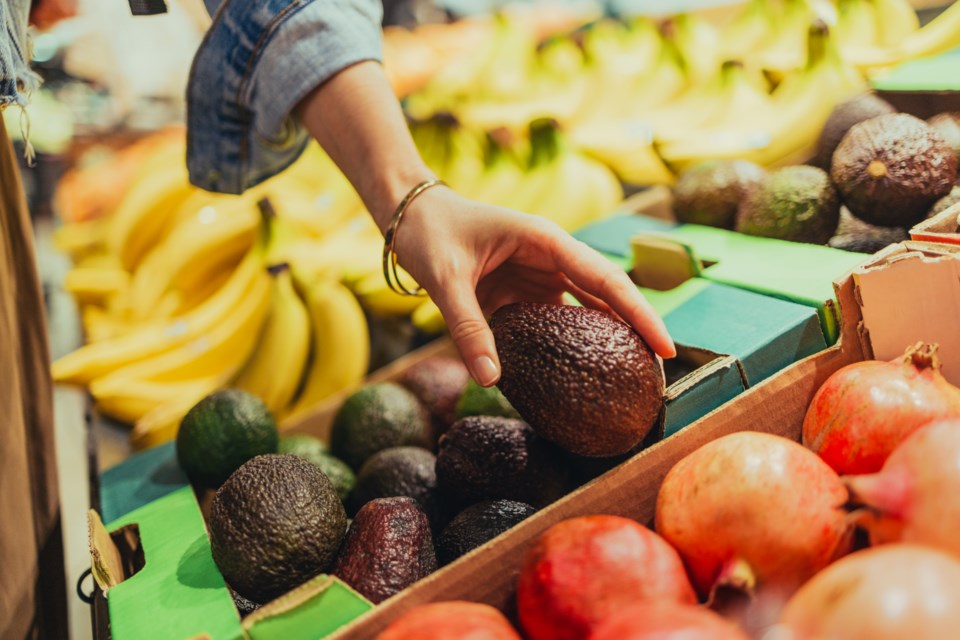Let's see… A nice little cantaloupe from "Mike" in Honduras. An even nicer one from Guatemala. Mexican avocadoes. Strawberries from Abbotsford! Local greenhouse tomatoes, too, along with radishes and kale from the Fraser Valley. But, oops—there's also some organic Fuji apples from the old U.S. of A.
So, my fellow shoppers, how's it going so far with all this singing from the "buy Canadian" song sheet?
That little list above is just a slice of some of the fresh produce that has graced the plates and tummies around our house lately. And while it might feel like a hundred years ago, I remind us all it was only Jan. 20 when Trump was inaugurated, although his strategic bullying and threats to our fair nation started earlier. But now that the chaos is quieting, I had to stop and wonder about a few things—including wondering if you're wondering, too.
About buying pears shipped all the way from Argentina rather than ones from Washington state or, better, B.C.—if you can find them. Or that cantaloupe from Central America, not California. And beautiful Egyptian oranges, instead of those sweet and juicy Blue Jays from south of the border. (Yeppur, "Blue Jay" is the branding of some great American oranges, much like that great Canadian baseball team.)
Many of my wandering wonderings drifted in like a fresh spring breeze the other day as I was reading about people across the country who've tried—and often succeeded—in buying nothing but "Made in Canada." Some tried for a week while others, like an interesting and very determined Vancouver guy, shopped totally "Canadian" for an entire year! Think about it: Food, drink, durable goods, the whole nine yards. Understandably, it drove his wife a bit nuts.
Some did it five, 10, even 15 years ago—when Trump was still on The Apprentice, rehearsing for his role as leader of the most powerful nation on Earth. But most of these stalwart all-Canadian shoppers we find online (more on that fraught situation later) have only been at it since Trump's tariff tantrums began and caused us all to react. That's when I first tackled the topic (see my Feb. 13 column in Pique), putting out feelers for readers' reactions.
A great one came in from that inimitable brew master and original thinker at Whistler Brewing Company, Clinton Small—the former Bearfoot Bistro chef originally from New South Wales.
I really liked Clinton’s implied cautions about the dangers of what could easily be seen as consumer-led jingoism, along with his more general wonderings around all things "buy Canadian."
To be clear, Clinton, like many of us, was already in the habit of actively supporting and buying Canadian-made products, especially local produce from Pemberton farms and our great farmers' markets whenever possible. Maybe a big difference is he also easily recalls how COVID quickly showed us how sensitive the supply chain can be.
And here we go again, by "bullwhipping products that the consumer is now buying in place of their normal products," he notes, especially when it isn’t necessarily replacing a U.S. product but rather messing with other products and the international supply systems around them, like those Argentinian pears and Egyptian oranges. So much for the old 100-mile diet, which started in a northern B.C. cabin more than 20 years ago.
So what are we really strengthening and weakening by nixing U.S. goods, especially in light of our much-vaunted free trade agreements with both neighbours south of the border.
"By pushing 'buy Canadian' are we now anti-free trade? Do Canadians want to try to be self-reliant now? Say goodbye to year-round tropical fruit?" Clinton pondered via email. "Free trade helps us focus on what we can make cheaply or better than others, so we can export these products and have the same in return. Both parties win…
"Let’s do what we are good at and, frankly, able to. The U.S. doesn’t need to be part of this, but it would be nice."
Indeed.
Don't know about you, but our household is in much the same boat. Even though we might be amazed by them, we're total slackers compared to those folks who only buy Canadian. I often feel a twang of guilt buying avocadoes or papayas—but still do it.
Like many, we've been more or less shopping "Canadian" and "local" for years, with much of the focus on fresh produce. When there's a choice for services, durable goods like clothes, or certain food items, we definitely try. And the keyword there is try because you have to admit that even at Canadian Tire, which is still Canadian-owned, it's tough buying all-Canadian. Then when summer hits and B.C. produce abounds, it's pretty much local, local, local all the way.
Sound familiar?
As for going whole hog on buying Canadian, I'm with Clinton, too, in questioning the full-on impacts further up, or down, the food chain, so to speak. Like, is it efficient? Or genuinely thoughtful and "fair to all" beyond fair trade—especially when it comes to the environment? I'm no economist, but if you're trying to be a good planetary citizen and take a page from the medical mandate "do no harm" or at least as little as possible, what do you pick when faced with gorgeous, U.S.-grown organic tomatoes versus conventional Canadian ones?
Reminds me of something a dear friend visiting from England recently shared: Since the U.K. left the European Union and all the incumbent trade agreements, most of their fresh produce now comes from South America, Egypt—you name it—rather than, say, the Netherlands, just a stone's throw across the channel, or Spain.
Think of it: All that extra jet fuel, and bunker fuel for ships—a lower grade than diesel; all those extra logistics and energy to haul this stuff through many more jurisdictions, many more thousands of miles.
Maybe a mixed bag with some of those Blue Jay oranges isn't so bad after all.
Glenda Bartosh is an award-winning journalist who often hesitates over the best thing to buy.




